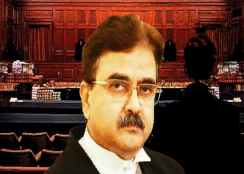Ahmedabad
(Head Office)Address : 506, 3rd EYE THREE (III), Opp. Induben Khakhrawala, Girish Cold Drink Cross Road, CG Road, Navrangpura, Ahmedabad, 380009.
Mobile : 8469231587 / 9586028957
Telephone : 079-40098991
E-mail: dics.upsc@gmail.com

Judge’s entering into Politics – The controversy
Context: Justice Abhijit Gangopadhyay, a sitting judge of the Calcutta High Court, recently announced his intent to resign from his position as a judge.
• His decision was not due to dissatisfaction with the judicial system but rather his eagerness to engage in politics.
Background:
• He stated, “For the past couple of years, I was dealing with some matters in which huge corruption had been unearthed. I feel like my duty as a judge is now over. This is a call of my conscience that now I should go to the people. In our country and in West Bengal, there are a large number of people who cannot come to court. Only politicians can do something to help them. I want to work for those people now.”
• Justice Gangopadhyay had directed investigation by the Central Bureau of Investigation (CBI) on at least 14 occasions in cases relating to the school and municipal recruitment scam in West Bengal. This resulted in arrests of ministers and leaders, exposingcorruption in the recruitment system.
What is the issue with entry of judges in Politics?
• It contributes to erosion of trust in the overall judiciary.
• There have been questions on the impartiality of orders delivered by the judge during his tenure.
• There have been demands seeking a review of all orders as there are doubts about potential political bias.
• The resignation of the former judge before superannuation opens him to political attacks. The timing of his resignation is being questioned amid BJP’s candidate selection for Lok Sabha polls. However, the judge cites the desire to contribute to the state on a larger platform beyond judiciary limitations.
Does the Indian constitution stop a Supreme court or a high court judge from participating in Politics?
• The Indian Constitution does not explicitly prohibit a Supreme Court or High Court judge from participating in politics. However, it is essential to maintain a delicate balance between their judicial roles and political engagement.
• While judges have historically been associated with political parties, their affiliations have not been a disqualifying factor for their appointments. The Constitution emphasizes Indian citizenship as a qualification for judges, but it does not specifically bar them from engaging in political activities.

Address : 506, 3rd EYE THREE (III), Opp. Induben Khakhrawala, Girish Cold Drink Cross Road, CG Road, Navrangpura, Ahmedabad, 380009.
Mobile : 8469231587 / 9586028957
Telephone : 079-40098991
E-mail: dics.upsc@gmail.com
Address: A-306, The Landmark, Urjanagar-1, Opp. Spicy Street, Kudasan – Por Road, Kudasan, Gandhinagar – 382421
Mobile : 9723832444 / 9723932444
E-mail: dics.gnagar@gmail.com
Address: 2nd Floor, 9 Shivali Society, L&T Circle, opp. Ratri Bazar, Karelibaugh, Vadodara, 390018
Mobile : 9725692037 / 9725692054
E-mail: dics.vadodara@gmail.com
Address: 403, Raj Victoria, Opp. Pal Walkway, Near Galaxy Circle, Pal, Surat-394510
Mobile : 8401031583 / 8401031587
E-mail: dics.surat@gmail.com
Address: 303,305 K 158 Complex Above Magson, Sindhubhavan Road Ahmedabad-380059
Mobile : 9974751177 / 8469231587
E-mail: dicssbr@gmail.com
Address: 57/17, 2nd Floor, Old Rajinder Nagar Market, Bada Bazaar Marg, Delhi-60
Mobile : 9104830862 / 9104830865
E-mail: dics.newdelhi@gmail.com